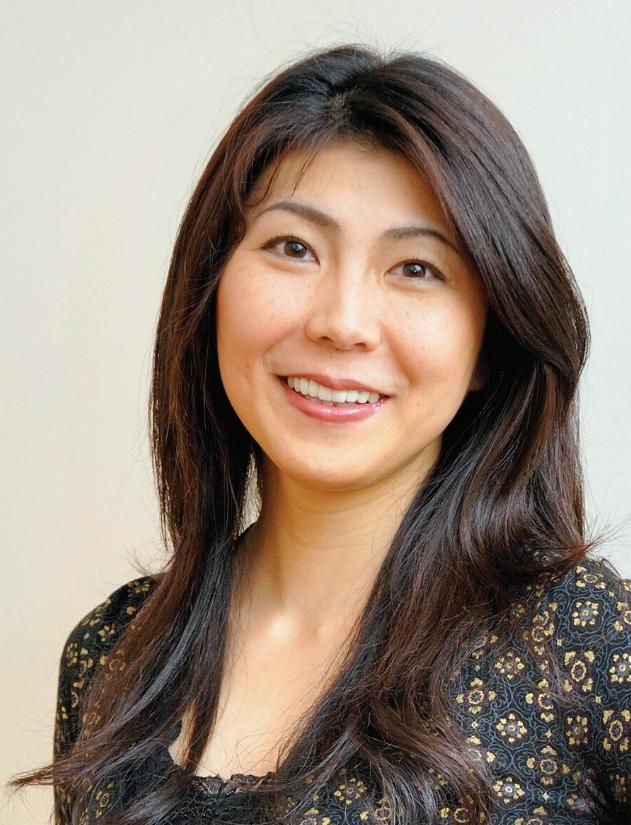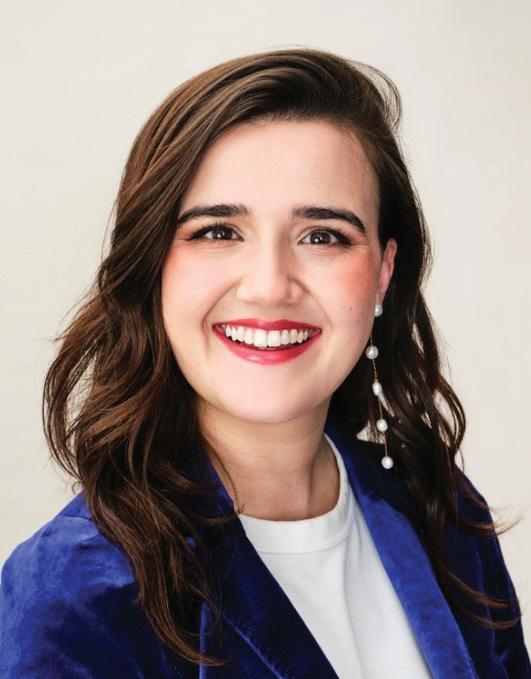Puccini’s
MADAME BUTTERFLY
MAY 3 (7:30PM), MAY 5 (7:00PM), MAY 7 (7:00PM), MAY 9 (7:30PM), MAY 11 (2:00PM)
JANET QUINNEY LAWSON CAPITOL THEATRE
Composed by Giacomo Puccini with Libretto by Giuseppe Giacosa & Luigi Illica Premiere – February 17, 1904, Milan, La Scala
Previously at Utah Opera – 2014, 2008, 2001, 1993, 1986, 1979 Performed in Italian with English Supertitles (Captions)
CAST
(in order of vocal appearance)
Lt. Pinkerton Eric Taylor
Goro Martin Bakari
Suzuki ........................................... Nina Yoshida Nelsen
Sharpless Nmon Ford
Cio-Cio-San, Madame Butterfly Hiromi Omura
The Imperial Commissioner ............................. Rodney Sharp II*
The Official Registrar Aaron McKone*
The Bonze Zaikuan Song
Prince Yamadori ........................................ Kevin Nakatani
Kate Pinkerton Sarah Scofield*
Trouble please see insert
ARTISTIC TEAM
Conductor Benjamin Manis
Stage Director Matthew Ozawa
Associate Stage Director Anderson Nunnelley
Chorus Director & Assistant Conductor Austin McWilliams
Scenic Designer dots
Costume Designer .................................. Maiko Matsushima
Lighting Designer Yuki Nakase Link
Assistant Lighting Designer Ari Jamieson
Wig & Makeup Designer ...................................Kate Casalino
Principal Coach Carol Anderson
Rehearsal Pianist Jie Fang Goh*
Fight Director ....................................... Christopher DuVal
Stage Manager Kathleen Edwards
Assistant Stage Managers Mickey Acton & Ben Kulwanoski
Supertitle Musician ..................................... Mitchell Atencio
A Co-Production of Utah Opera, Cincinnati Opera, Detroit Opera, and Pittsburgh Opera
Directed by Matthew Ozawa
Scenery Designed by Kimie Nishikawa and dots
Costumes Designed by Maiko Matsushima
Lighting Designed by Yuki Nakase Link
Supertitle Translation created for Cincinnati Opera
The performance run time is approximately 2 hours 50 minutes with 1 intermission
*Current Resident Artist

Martin Bakari (Washington)
Goro
Most Recently at Utah Opera, The Long Walk
Recently:
La traviata, Seiji Ozawa Music Festival
Jubilee, Seattle Opera
Upcoming:
Steele Roots, The Atlanta Opera
The Shining, Nashville Opera

dots (New York City)
Set Design Collective
Utah Opera Debut
Recently:
An Enemy of the People, Floyd Collins, Romeo + Juliet, Oh, Mary!, Appropriate, and The Sign in Sidney Brustein’s Window, Circle in the Square Theatre on Broadway
Kate, Pasadena Playhouse

Kate Casalino (New York)
Wig & Makeup Designer
Most Recently at Utah Opera, Pagliacci
Recently:
Beautiful: The Carole King Musical, Pioneer Theatre Company
Hansel and Gretel, Utah Opera
Upcoming:
Beautiful: The Carole King Musical, Geva Theatre
The Shining, Utah Opera

Nmon Ford (California)
Sharpless
Most Recently at Utah Opera, Florencia en el Amazonas
Recently:
Carmen, English National Opera, Opera Colorado, and Calgary Opera
Madame Butterfly, Cincinnati Opera, Detroit Opera, and Pittsburgh Opera
Pagliacci, Opera North Carolina
Samson and Dalila, Opera Colorado

Yuki Nakase Link (New York)
Lighting Designer
Utah Opera Debut
Recently:
Dialogues des Carmélites, The Juilliard School
Rainbird, Mabou Mines
Così fan tutte, Detroit Opera
Upcoming:
Parsifal, San Francisco Opera

Maiko Matsushima (New York)
Costume Designer
Utah Opera Debut
Recently:
Madame Butterfly, Detroit Opera and Cincinnati Opera
Blood Moon, Prototype Festival/Beth Morrison Projects

Benjamin Manis (Illinois)
Conductor
Most Recently at Utah Opera, The Little Prince
Recently:
The Ghosts of Versailles, Rice University
Carmen, San Francisco Opera
Upcoming:
Of Mice and Men, Houston Grand Opera
The Barber of Seville, San Francisco Opera

Aaron McKone (South Carolina)
The Official Registrar
Most Recently at Utah Opera, Pagliacci
Recently:
Utah Opera Resident Artist
Hamlet, Cincinnati Symphony Orchestra
Madama Butterfly, Opera Naples
Upcoming:
Apprentice Artist, The Santa Fe Opera
The Shining, Utah Opera

Austin McWilliams (Missouri)
Chorus Director
Most Recently at Utah Opera, Pagliacci
Recently:
Associate Conductor & Chorus Master, Opera Grand Rapids
Director of Choral Activities, Aquinas College
Upcoming:
Faculty, Missouri Scholars Academy
Utah Symphony | Utah Opera 2025–2026 Season

Nina Yoshida Nelsen (Indiana)
Suzuki
Most Recently at Utah Opera, The Marriage of Figaro
Recently:
An American Soldier, Perelman Performing Arts Center
Madama Butterfly, Anchorage Opera
Upcoming:
Madama Butterfly, Calgary Opera

Kevin Nakatani (Utah)
Prince Yamadori
Most Recently at Utah Opera, Sweeney Todd
Recently:
The Daughter of the Regiment, Utah Opera
The Pirates of Penzance, Utah Opera

Hiromi Omura (Japan)
Cio-Cio-San, Madame Butterfly
Utah Opera Debut
Recently:
Madama Butterfly, Tokyo Nikikai Opera
Madama Butterfly, Pittsburgh Opera
Upcoming:
Madama Butterfly, Polish National Opera

Matthew Ozawa (Illinois)
Stage Director
Utah Opera Debut
Recently:
Madame Butterfly, Pittsburgh Opera
Romeo and Juliet, Minnesota Opera
Fidelio, Lyric Opera of Chicago

Sarah Scofield (France)
Kate Pinkerton
Most Recently at Utah Opera, Hansel and Gretel
Recently:
Utah Opera Resident Artist
Thaïs, Utah Opera
The Little Prince, Utah Opera

Eric Taylor (Utah) Lt. Pinkerton
Utah Opera Debut
Recently:
Carmen, Jacksonville Symphony
Roméo et Juliette, Palm Beach Opera
Madama Butterfly, Pittsburgh Opera

Rodney Sharp II (Texas)
The Imperial Commissioner
Utah Opera Debut
Recently:
Utah Opera Resident Artist
Messiah, Utah Symphony | Utah Opera
Gianni Schicchi, Miami Music Festival
Upcoming:
The Shining, Utah Opera
Fidelio, Utah Opera

Zaikuan Song (China)
The Bonze
Utah Opera Debut
Recently:
The Big Swim, Asia Society Texas Center
Verdi’s Requiem, National Philharmonic, Opera Orlando
Turandot, Opera Delaware
Lucia di Lammermoor, Opera Orlando
UTAH OPERA CHORUS
Sopranos
Lauren Cartwright Bohannan
Anadine Burrell
Genevieve Gannon
Karllen Johnson
April Meservy
Heather Perry
Katie Sullivan
Altos
Natalie Easter
Paula Fowler
Melissa James
Rebecca Keel
Julie McBeth
Dawn Veree
Valerie Wadsworth
Tenors
Dyson Ford
Ryan Francis
Samuel Lorenzo Gilbert
Elijah Hancock
Lucas Henry Proctor
Carson Smith
Carl Wadsworth
SUPERNUMERARIES (See Insert)
UTAH’S WEEKLY POLITICAL ROUNDUP




RELEASING BUTTERFLY
By Matthew Ozawa Stage Director of Madame Butterfly
As we allow ourselves to become immersed in the fantasy of Japan portrayed in Puccini’s Madame Butterfly, it’s illuminating to consider through whose lens we are viewing this opera. What experiences, perspectives, histories, and biases do we bring with us as we engage with Butterfly’s story?
When I investigate my own lens, I see that mine represents the East-West conflict that is core to Madame Butterfly I am biracial – the son of a Caucasian mother and a Japanese father. I am an American whose family was interned during World War II. I grew up in Asia but spent holidays in California. I have spent most of my professional life devoted to the Western art form of opera, though I am often one of the only artists of color in the spaces where I work. I have loved Western classical music as much as I have loved Eastern art forms. Like Butterfly, I have yearned for acceptance but never felt truly at home in any single culture or place.
Butterfly has spent most of her existence seen through the lens of Western white men. Her story was first told by French novelist Pierre Loti, and it then passed successively to American writer John Luther Long, American playwright
David Belasco, and Italian composer Giacomo Puccini. Likewise, so many of the Butterfly productions we have enjoyed throughout history have presented her story primarily through a white male lens. This fantasy of Japan has been created not by those whose culture is meant to be represented in the opera—namely, Japanese people and, in particular, Japanese women—but by those who, in many cases, have had no direct connection to Japan. Has this tradition had an impact on those whose story Madame Butterfly has actually meant to represent? I believe it has.
This new production of Madame Butterfly reclaims the opera’s narrative through the lens of an entirely Japanese and Japanese American creative team and amplifies the voices of an entirely female Japanese design collective. Together, we have grappled with the challenges of presenting this work for diverse American audiences. Just as Butterfly is trapped with little agency in the opera, we as Asian Americans have been trapped by many of the traditional depictions of Butterfly’s story. We seek now to release this opera’s wings for all to experience anew. To do this, we own that the fantasy of Butterfly that we have come to love is a Western fantasy. Instead of pretending that Butterfly is representative of our Japanese American identity, our production aims to amplify that her story has been seen through the lens of a white man, Pinkerton.
For me, Madame Butterfly is an opera I have spent 20 years studying and directing. I have deep love for this work, but it has simultaneously made me, as an Asian American, feel ostracized, and I have felt a duty to reclaim its narrative. With this new production, we aim to acknowledge that there are many ways to view this opera. Our hope is that this journey enables our empathy to be open to the impact we have on each other, and the need for a more compassionate understanding of perspectives outside our own. May the voyage into this production’s fantasy capture your senses, sweep you up in the music’s emotional power, and awaken your own lens.
STORY OF THE OPERA
ACT I
In the present day, B.F. Pinkerton enters his apartment and dons a VR headset to escape into a fantasy. Within moments, he rejoins a game which transports him to Nagasaki, where he embodies his avatar as a U.S. Navy lieutenant. He inspects a house that he will occupy with his young bride, Cio-Cio- San (a.k.a. Madame Butterfly). Sharpless, the U.S. Consul, arrives, and Pinkerton shares his vision of a sailor in search of pleasure and the beautiful Japanese girl who has captivated him. Sharpless tries to warn him of this view, but Pinkerton laughs, toasting the American girl who will someday be his “real” wife.
Butterfly, her colleagues, and family arrive for the wedding. She tells Pinkerton that since her father’s death, she now earns her living as a geisha. She also has secretly converted to Christianity. The Imperial Commissioner performs the marriage ceremony. Then, Cio-Cio-San’s uncle, the Bonze, bursts in. He curses her, inciting the crowd. Protecting Butterfly, Pinkerton orders the guests away. Butterfly weeps and her new husband consoles her. As night falls in this pleasure fantasy, the lovers share a moonlit duet.
ACT II
Three years later, modern-day Pinkerton and his American wife have grown distant. His only means of escape is through gaming, where he can manipulate his Japanese bride’s future. In the virtual world, Cio-Cio-San patiently waits for him. Her servant Suzuki implores the gods for aid,
but Butterfly bids her to have faith—one day, Pinkerton will return and embrace his wife again.
Sharpless enters with a letter telling of Pinkerton’s marriage to an American. Before he can tell Butterfly, Goro interrupts along with a suitor, Prince Yamadori. Cio-Cio-San refuses his marriage proposal. She brings forth her young son, Trouble, and insists that as soon as Pinkerton knows of him, he will return. If not, she would rather die.
A cannon roars from the harbor, and Butterfly discovers Pinkerton’s ship coming into port. She and Suzuki strew the house with blossoms. As evening falls, she prepares to keep vigil through the night.
ACT III
Modern-day Pinkerton turns off the game and goes to bed. In the middle of the night, the game turns on, luring him back to play the next level, where he chooses how he will impact Butterfly’s destiny. Pinkerton chooses an American wife avatar, Kate. As the level continues, Butterfly still waits, though Suzuki persuades her to rest. Soon, Sharpless, Pinkerton and Kate arrive. Suzuki realizes who the woman is and reluctantly agrees to inform Butterfly. Pinkerton, now aware of Butterfly’s devotion, bids an anguished farewell and rushes away. Cio-Cio-San hurries in expecting to find her husband, and instead finds Kate. She instantly guesses the truth and touchingly wishes Kate happiness. She says that Pinkerton may have his son if he will return for him.
Butterfly orders Suzuki and Trouble away. She has no choice but to escape this nightmare, and she pulls out the dagger with which her father committed suicide. As she raises the blade to her throat, Trouble appears. Cio-Cio-San drops the knife and embraces him. She then blindfolds him, takes the dagger, and stabs herself. As the fantasy dies, Pinkerton desperately tries to hold onto his creation, Butterfly.
